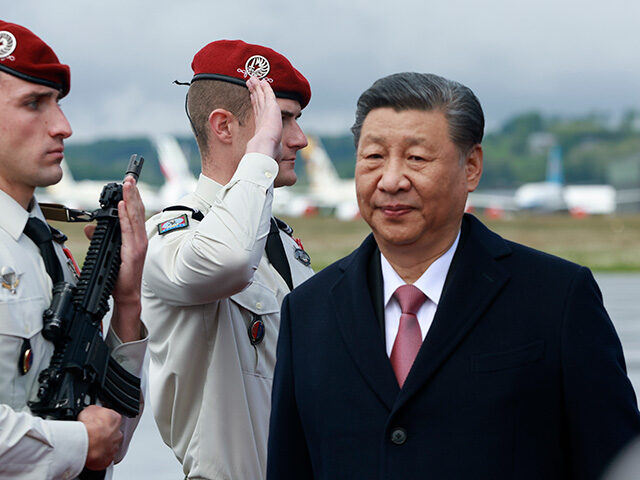Genocidal Chinese dictator Xi Jinping is expected to arrive in Serbia on Tuesday, the 25th anniversary of NATO forces bombing the Chinese embassy in Belgrade.
The incident, described by State Department officials at the time as a “mistake” and an “awful tragedy,” killed three people: Chinese journalists Shao Yunhuan, Xu Xinghu, and his wife Zhu Ying. It took place in the context of the larger NATO military operation against Yugoslav authorities at the time, which NATO leaders justified as necessary to end an ongoing ethnic cleansing campaign by the Federal Republic of Yugoslavia, then led by Slobodan Milosevic.
Xi made clear prior to arriving in Serbia that he did not view NATO countries as allies or the NATO agenda as necessarily compatible with China’s by acknowledging the anniversary. the dictator honored those killed in an article published in the Serbian newspaper Politika on Tuesday, insisting, “we should never forget this.”
“Twenty-five years ago, NATO bombed the Chinese embassy in Yugoslavia, killing three Chinese reporters: Shao Yunhuan, Xu Xinghu and his wife Zhu Ying,” Xi wrote, according to a translation of the article published by the Russian news agency Tass. “We should never forget this. The Chinese people cherish peace, but we will never allow such a tragic incident to happen again.”
The Chinese Foreign Ministry marked the anniversary by condemning the “barbaric” attack and suggesting that NATO could act similarly in the future.
“25 years ago, the US-led NATO forces illegally attacked the sovereign state of Yugoslavia without the authorization of the UN Security Council, killing thousands of innocent civilians, including three Chinese journalists,” Foreign Ministry spokesman Lin Jian told reporters during his regular briefing on Tuesday.
“The Chinese people will never forget this barbaric atrocity committed by NATO and will never accept such tragic history repeating itself,” he asserted. “Each year, commemorative events are held by Serbia and the Chinese Embassy in Belgrade.”
The South China Morning Post suggested that Xi was “expected to join the commemorations” in Belgrade of the bombing, though the Chinese Foreign Ministry did not offer details of his itinerary. Foreign policy experts suggested that the emphasis on remind the world of the bombing was an attempt to clarify that China has no interest in supporting NATO countries in their current endeavor of opposing Russia’s ongoing invasion of Ukraine. China is one of Russia’s closest allies and a prominent buyer of Russian oil, but also maintains friendly relations with Ukraine, a member of China’s predatory Belt and Road Initiative (BRI) that has invited Beijing to help rebuild after the war.
The bombing of the Chinese embassy in Belgrade served no overt military or geopolitical purpose and the administration of leftist then-President Bill Clinton declared it entirely an error. In a letter to Chinese authorities in June 1999, top State Department official Thomas Pickering said plainly, “the attack was a mistake.”
“Let me emphasize: no one targeted the Chinese Embassy. No one, at any stage in the process, realized that our bombs were aimed at the Chinese Embassy,” Pickering said, claiming that military officials had used incorrect maps in an attempt to target Yugoslavia’s Federal Directorate for Supply and Procurement (FDSP) at the site that actually held the Chinese diplomatic post.
China’s response at the time – under President Jiang Zemin, the Communist Party leader tasked with rehabilitating China’s image after the Tiananmen Square massacre – was to condemn the act, but ultimately take little other action. Clinton, in turn, made up for the strike by spearheading efforts that eventually led to China joining the World Trade Organization (WTO) under highly favorable conditions.
“Today China embraces principles of economic openness, innovation and competition that will bolster China’s economic reforms and advance the rule of law,” Clinton said in November 1999, six months after the bombing, a statement that contradicted the communist reality of the country both then and now.
At press time, Xi is in France, culminating a visit that began on Sunday and featured a lavish dinner hosted by President Emmanuel Macron on Monday. While reports prior to his visit suggested Macron would use his time with Xi to galvanize support for Ukraine, Xi spent much of Monday in a meeting with Macron and European Union President Ursula von der Leyen, reportedly discussing expanding Chinese economic influence in Europe. The Ukraine invasion appeared in passing mentions in statements from the parties involved.
In addition to France and Serbia, Xi will also visit Hungary in the last leg of his Europe tour.
The tour is Xi’s first in Europe in five years – since the onset of the Wuhan coronavirus pandemic, caused in large part by Chinese government policies – and heavily focused on economic ties. Xi reportedly chose France as the first stop as it is the first country on the continent to establish diplomatic ties with the Communist Party.
China’s close relationship with Russia, one of Serbia’s top allies, and distaste for NATO has made it a longtime friendly state in the eyes of Serbian officials. According to the Serbian newspaper Telegraf, Belgrade is preparing a massive ceremonial welcome for Xi, including a Chinese delegation of over 400 people and an aerial escort by Serbian MiG-29 warplanes.
Serbian officials have also draped much of the city of Belgrade in massive Chinese communist flags.
Xi is expected to remain in Serbia for two days before heading to Budapest.

COMMENTS
Please let us know if you're having issues with commenting.